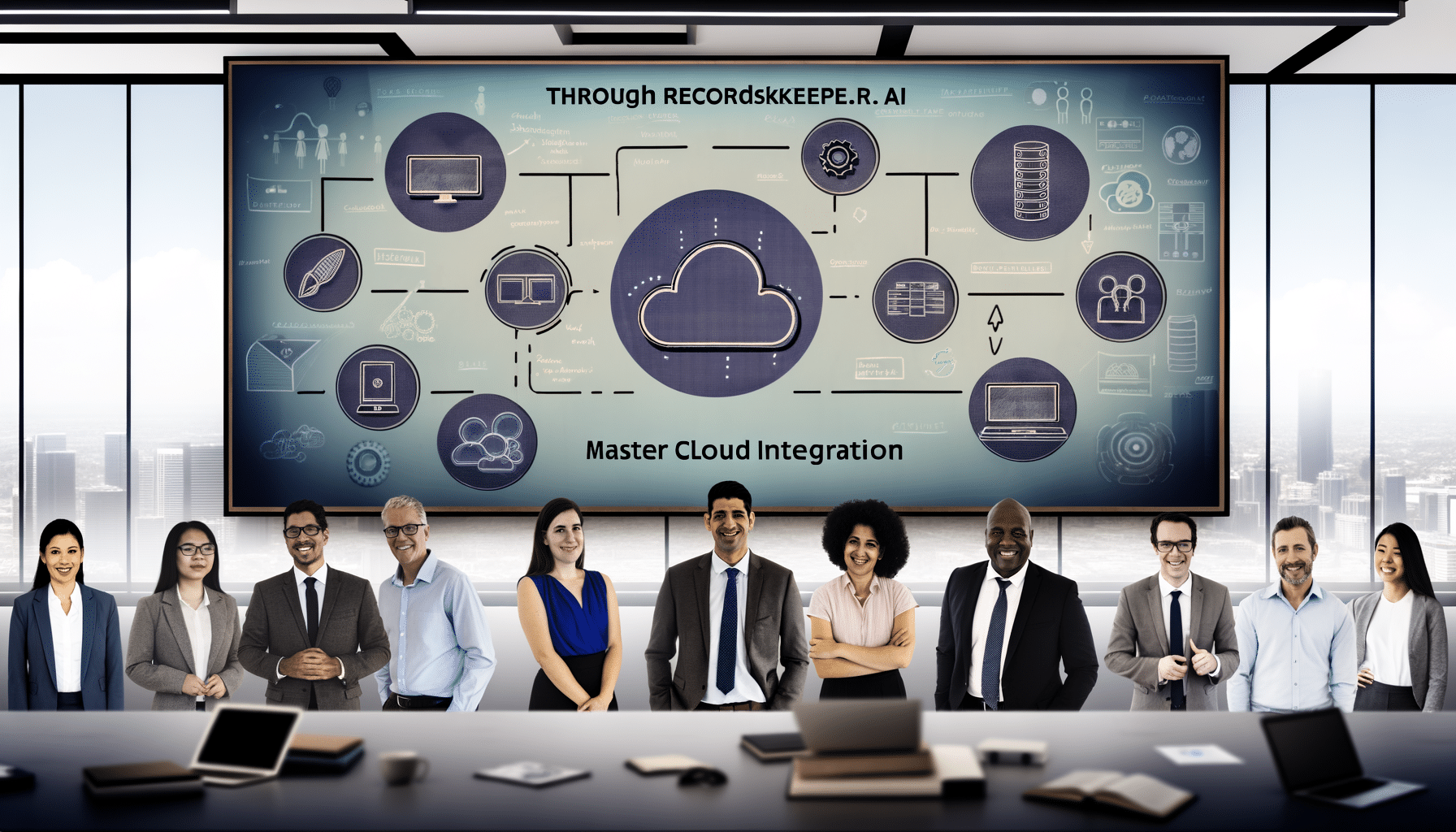- Cloud Computing
- November 16, 2024
Through RecordsKeeper.AI: Master Cloud Integration

In today’s fast-paced business environment, cloud integration is no longer optional; it’s a necessity. As companies strive to build more efficient, scalable, and streamlined operations, the ability to master cloud integration becomes not just a matter of convenience but a strategic imperative. Through my experience founding RecordsKeeper.AI, I’ve come to understand the profound impact that proper cloud-based record management can have on an organization’s efficiency and security. In this piece, I’ll share insights into how you can perfect cloud integration using RecordsKeeper.AI, transforming traditional record management into a comprehensive, cloud-enabled strategy.
The Benefits of Cloud Integration in Record Management
The migration to cloud-based solutions for record management offers several compelling advantages. Chief among them is the enhanced accessibility that cloud integration affords. When records are stored securely in the cloud, they become available anytime, anywhere, and are no longer bound by the physical constraints of traditional data storage. This accessibility is critical for distributed teams that need to collaborate across geographies and time zones.
Additionally, the cloud offers unmatched scalability. As your organization grows, your need for data storage and processing power will naturally expand. Cloud platforms allow you to scale your storage solutions without incurring the prohibitive costs associated with physical upgrades or new servers.
Security and Compliance: The Cornerstones of Cloud Integration
Security is often a concern when shifting operations to the cloud. However, cloud platforms have evolved to offer robust security features, often surpassing the security capabilities of on-premises solutions. With RecordsKeeper.AI, users benefit from advanced security protocols, including end-to-end encryption and secure data rooms that control access and track real-time activity.
Moreover, compliance is natively integrated into the cloud where regulatory adherence becomes less burdensome. Features such as automated compliance management with adherence to standards like GDPR, HIPAA, and SOX mean that your organization remains compliant with minimal manual intervention.
Automated Categorization: The AI Edge
One of the most powerful features of RecordsKeeper.AI is automated categorization powered by AI. This functionality brings a new level of mastery to cloud integration by allowing unprecedented control and efficiency in managing large volumes of records.
AI tools in RecordsKeeper.AI automatically classify and tag records, ensuring that categorization is consistent and accurate. This not only saves time but also significantly reduces the risk of human error in data classification.
Seamless Integration for Enhanced Performance
Cloud integration with RecordsKeeper.AI allows for seamless interaction with existing enterprise systems. Whether you’re using a CRM, ERP, or custom applications, RecordsKeeper.AI is designed to integrate smoothly, ensuring that the flow of information is uninterrupted and reliable.
This seamless integration allows businesses to maintain their existing workflows while enhancing them with the power and agility of the cloud, resulting in improved performance and user satisfaction.
Recovery and Backup: Ensuring Business Continuity
Another critical advantage of mastering cloud integration with RecordsKeeper.AI is the robust backup and recovery features it provides. With regular automated backups and quick recovery options, RecordsKeeper.AI ensures that you can restore your data with minimal downtime, safeguarding your business continuity against unexpected disruptions.
Empower Your Business with RecordsKeeper.AI
If you’re seeking a robust, cloud-based solution to master your record management, RecordsKeeper.AI offers the tools you need to transform your data handling processes. By integrating cutting-edge technologies like AI and Blockchain, RecordsKeeper.AI revolutionizes the way records are managed, making it an indispensable tool for legal, finance, and compliance heads tasked with overseeing record keeping.
Through our secure and compliant platform, RecordsKeeper.AI empowers organizations to take full control of their data management, enhance security protocols, and ensure that compliance is consistently maintained.
Conclusion
The future of record management is in the cloud, where integration mastery brings untold efficiencies and innovations. By leveraging RecordsKeeper.AI, businesses not only secure their data but also position themselves at the cutting edge of record management technology. Embrace this cloud-enabled transformation and discover how your organization can benefit from the efficiency and security that RecordsKeeper.AI offers. To stay informed about the latest in cloud integration and record management, I invite you to follow my journey with RecordsKeeper.AI.
Toshendra Sharma is the visionary founder and CEO of RecordsKeeper.AI, spearheading the fusion of AI and blockchain to redefine enterprise record management. With a groundbreaking approach to solving complex business challenges, Toshendra combines deep expertise in blockchain and artificial intelligence with an acute understanding of enterprise compliance and security needs.
Related Posts

How Cloud Technology Enhances Scalability in Healthcare Record Management
Understand the role of cloud solutions in scaling healthcare record systems.
- December 11, 2023

Cloud-Native Solutions for Secure and Scalable Record-Keeping
Explore how cloud-native technologies enhance scalability and security for records.
- September 24, 2023
Archives
- January 2025
- December 2024
- November 2024
- October 2024
- September 2024
- August 2024
- July 2024
- June 2024
- May 2024
- April 2024
- March 2024
- February 2024
- January 2024
- December 2023
- November 2023
- October 2023
- September 2023
- August 2023
- July 2023
- June 2023
- May 2023
- April 2023
- March 2023
- February 2023
- January 2023
- December 2022
- November 2022
- October 2022
- September 2022
Want to get more content like this?
Signup to directly get this type of content to your inbox!!
Latest Post
Document Control for Equipment Maintenance
- January 20, 2025
Managing Records for Multiple Clients
- January 19, 2025
Handling Conference Documentation
- January 18, 2025
Setting Up Department Record Reviews
- January 17, 2025





